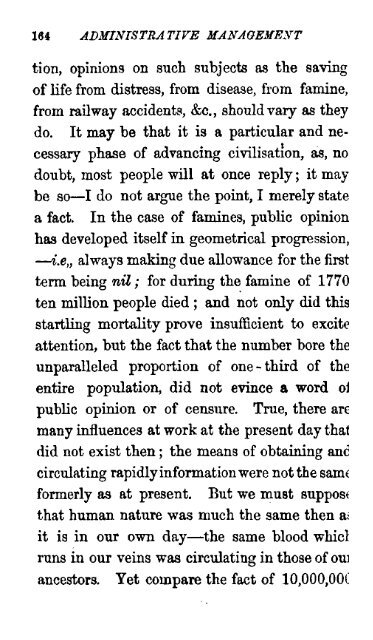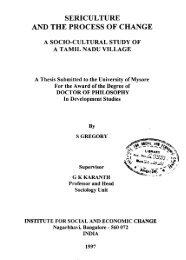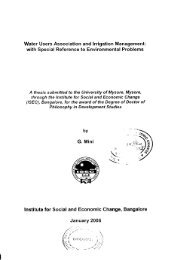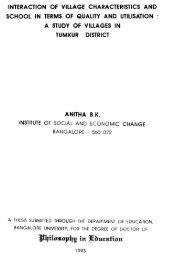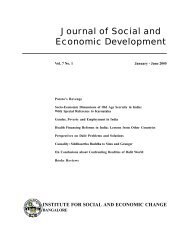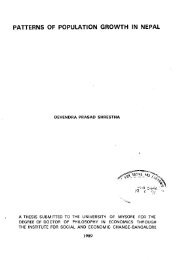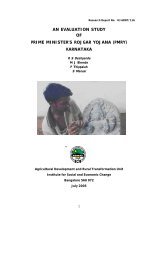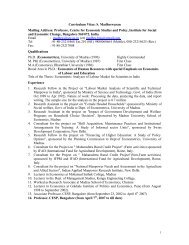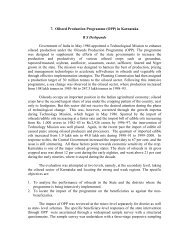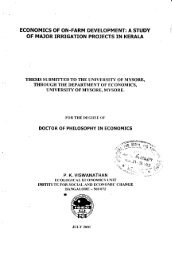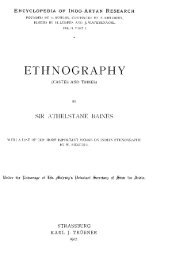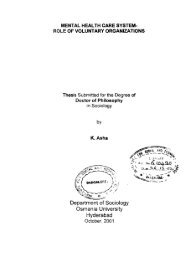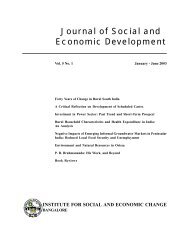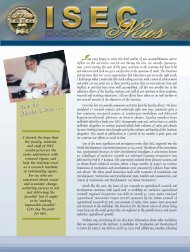- Page 1 and 2:
INDIAN FAMINES THEIR lllSTORICAL, F
- Page 3 and 4:
vi PREFACE. their opinion, or enabl
- Page 5 and 6:
viii PREFAOE. nature, and have been
- Page 7 and 8:
CONTENTS. CHAPTER I. TRADITIONAL AN
- Page 9 and 10:
CONTENTS. xiii prehending the many
- Page 11 and 12:
COKTE.STS. xv of famine: 1. the pru
- Page 13 and 14:
2 TRADITIONAL AND Experience, in fa
- Page 15 and 16:
TRAlJITIONAL ANlJ by its own Histor
- Page 17 and 18:
6 TRADITIONAL ASD changed in any wa
- Page 19 and 20:
II TRADITIONAL AND information rega
- Page 21 and 22:
10 TIUDITIONAL AND advisers informe
- Page 23 and 24:
12 TRADITIONAL AND his kingdom unde
- Page 25 and 26:
14 TRADITIONAL AND \ overseer recei
- Page 27 and 28:
16 TlUDITIO~VAL AN]) under the rule
- Page 29 and 30:
18 TRADITIONAL AND "In 1396, the dr
- Page 31 and 32:
10 TIUDITIONAL AND it. His father w
- Page 33 and 34:
22 TRADITIONAL A.YD the effect on t
- Page 35 and 36:
2-1 TRADITIONAL AND reputation in t
- Page 37 and 38:
26 TRADITIONAL AND the fact that ot
- Page 39 and 40:
28 TRADITIONAL AND As, in 1873, we
- Page 41 and 42:
so TRADITIONAL AND "The consequence
- Page 43 and 44:
TRADITIONAL AND But I do not think
- Page 45 and 46:
34 TRADITIONAL AND In Northern Indi
- Page 47 and 48:
36 TRADITIONAL AND fntermediate fam
- Page 49 and 50:
88 TRADITIONAL AND tention to the p
- Page 51 and 52:
RECENT FAMINES. CHAPTER II. RECENT
- Page 53 and 54:
4S RECENT FAMINES. way. But I shall
- Page 55 and 56:
RECEXT FAMI..YES. 1832. No doubt th
- Page 57 and 58:
46 RECENT FAMINES. were not much me
- Page 59 and 60:
48 RECENT FAMINES. Government, were
- Page 61 and 62:
110 RECENT FAMINES. practice which,
- Page 63 and 64:
52 RECENT FAMINES. and is only of n
- Page 65 and 66:
RECENT FAMINES. July a beneficent r
- Page 67 and 68:
56 REOENT FAMINES. (i. e., high-cas
- Page 69 and 70:
RECENT FAMINES. notice. To it princ
- Page 71 and 72:
60 RECENT FAMINES. pitable shore. T
- Page 73 and 74:
RECENT FAMINES. "large stores of gr
- Page 75 and 76:
RECENT FAMTNES. money-should be pro
- Page 77 and 78:
66 RECENT FAMINES. clearing obstacl
- Page 79 and 80:
68 RECENT FAMINES. ing years was ab
- Page 81 and 82:
70 'RECENT FAMINES. effects of fami
- Page 83 and 84:
72 RECE.YT FA1lfINES. seed. .A. sec
- Page 85 and 86:
RECENT FAMINES. little stock of gra
- Page 87 and 88:
'/'6 RECElfT FA.lfnrES. vest. This
- Page 89 and 90:
78 RECENT FAMINES. "Excluding the f
- Page 91 and 92:
80 RECENT FAMINES. From the wide ex
- Page 93 and 94:
82 RECENT FAMINES. less, their move
- Page 95 and 96:
84 FINANCIAL AND OTHER RESlILTS bee
- Page 97 and 98:
86 FINANCIAL AND OTHER RESULTS back
- Page 99 and 100:
88 FINANCIAL AND OTHER RESULTS nor
- Page 101 and 102:
OF PAST FAMINES. 91 remarks also ap
- Page 103 and 104:
OF PAST F4.MINES. as I am aware tha
- Page 105 and 106:
OF PAST FAMINES. 9& case. The yiew
- Page 107 and 108:
OF PAST FAM/XES. tion, and of cours
- Page 109 and 110:
OF PAST FAMINES. lief. It is eviden
- Page 111 and 112:
OF PAST FAMLVES. 101 spent in so ec
- Page 113 and 114:
OF PAST FAMINES. lOS gation project
- Page 115 and 116:
OF PAST FAMINES. 105 of affairs, bu
- Page 117 and 118:
OF PAST FAMINES. ]07 on the navigab
- Page 119 and 120:
OF PAST FAMINES. 1011 elude that we
- Page 121 and 122:
A FEW GENERAL'Cl!ITlCIS.lfS. III CH
- Page 123 and 124: .A FEW GENERAL ORITIOISMS. lIS man
- Page 125 and 126: A FEW GENERAL CRITICISA/S. 115 pres
- Page 127 and 128: A FEW GENERAL CRITICISMS. 117 perie
- Page 129 and 130: A FEW GENERAL CRlTICIS.lfS. 119 abo
- Page 131 and 132: A FEW GENERAL CRITICISMS. 121 princ
- Page 133 and 134: A FEW GENERAL CRITICISJ{S. 123 and
- Page 135 and 136: A FEW GENERAL CRITICISMS. 125 The n
- Page 137 and 138: 'A FEW GENERAL CRITICISMS, 127 it t
- Page 139 and 140: A FEW GEXERAL CRITICISJ/f!. 129 The
- Page 141 and 142: A FEW GENERAL CRITICISMS. 131 only
- Page 143 and 144: A FEW GENERAL CRITICISMS. 133 all t
- Page 145 and 146: .ADMINISTIUTIVE MANAGEMENT. 135 CHA
- Page 147 and 148: AXD PRESS CIIJTIC[SM. 137 frequentl
- Page 149 and 150: .AND PRESS ORITICISM. 139 bajra, an
- Page 151 and 152: AND PRESS CRITICISJl. 141 consequen
- Page 153 and 154: AND PRESS CRITICISM. U3 guished fro
- Page 155 and 156: AND PRESS ORITIOISM. 145 a period o
- Page 157 and 158: AND PRESS CRITICISM. 147 country; a
- Page 159 and 160: AND PRESS CRITICISM. 149 do in the
- Page 161 and 162: AND PRESS CRITICIS.l/. 151 this is
- Page 163 and 164: AND PRESS ORITICISM. 153 with respe
- Page 165 and 166: AND PRESS (JRITI(JISJI. 155 first b
- Page 167 and 168: AND PRESS ORITIOISM. 157 expenditur
- Page 169 and 170: AND PRESS CRITICISJf. 159 thropic a
- Page 171 and 172: AND PRESS CRITICISM. 161 England's
- Page 173: AII'D PRESS CRITICISM. 163 main ide
- Page 177 and 178: AND PRESS CRITICISM. 167 There is s
- Page 179 and 180: AND PRESS CRITICISM. 169 paid." Thi
- Page 181 and 182: AND PRESS CRITICISJI. 171 any furth
- Page 183 and 184: AND PRESS CRITICISM, li3 wages, and
- Page 185 and 186: AND PRESS CRITICISM. 175 without th
- Page 187 and 188: AND PRESS ORITICISM. 177 to the ass
- Page 189 and 190: EXECUTIVE !lfANAGEMENT. 179 CHAPTER
- Page 191 and 192: EXEOUTIVE MANAGEMENT. 181 physical
- Page 193 and 194: EXECUTIVE MAlvAGEMENT. 183 could be
- Page 195 and 196: EXECUTIVE MANAGEMENT. 185 doubt a c
- Page 197 and 198: EXECUTIVE AlANAGEJIE1'lT. ]87 witho
- Page 199 and 200: EXECUTIVE MANAGEMENT. 189 demand an
- Page 201 and 202: EXECUTIVE MANAGEMENT. 191 find out
- Page 203 and 204: PREVENTIVE ]'(EASURES. 193 CHAPTER
- Page 205 and 206: MITIGATIVE MEASU~. lP5 the natives
- Page 207 and 208: MITIGATIV"E MEASURES. 197 to be sen
- Page 209 and 210: MITIGATIVE MEASURES. 199 the same c
- Page 211 and 212: MITIGATIVE MEASURES. 201 involve th
- Page 213 and 214: MITIG.ATIVE ME.ASURES. 203 relief b
- Page 215 and 216: MITIGATIVE MEASURES. 205 famine tra
- Page 217 and 218: MITIGATIVE JIEASURES. 207 already i
- Page 219 and 220: MITIGATIVE MEASURES. 209 We have on
- Page 221 and 222: JIITIGA TIVE MEASURES. 211 therefor
- Page 223 and 224: }!lTIGA TIVE MEASURES. 213 is quite
- Page 225 and 226:
MITIGATIVE MEASURES. 215 canal, par
- Page 227 and 228:
MITIGATIVE MEASURES. 217 face; but
- Page 229 and 230:
MITIGATIVE MEASURES. 219 one case w
- Page 231 and 232:
221 APPENDIX. NOTES. l India is div
- Page 233 and 234:
APPENDIX. 223 Allahabad Central Com
- Page 235 and 236:
APPENDIX. Loc.u.rn. AUTHORITY. 1803
- Page 237 and 238:
APPENDIX. 227 Col. 5, Note 3.-Note
- Page 239 and 240:
APPEKDIX. 229 included the Punjab g
- Page 241 and 242:
APPElI'DIX. 231 cent WIIS added to
- Page 243 and 244:
~34 1 S No. of I-~amine. Year. I. 1
- Page 245 and 246:
236 APPENDIX. vation wages of three
- Page 247 and 248:
238 APPENDIX. Salisbury's questions
- Page 249 and 250:
240 APPENDIX. NOTE REGARDING THE RA
- Page 251 and 252:
2 Messrs BlaekwoIontgamery, and Bri
- Page 253:
JrJ e81rrs BlailnDoorl I< Pu blicat


